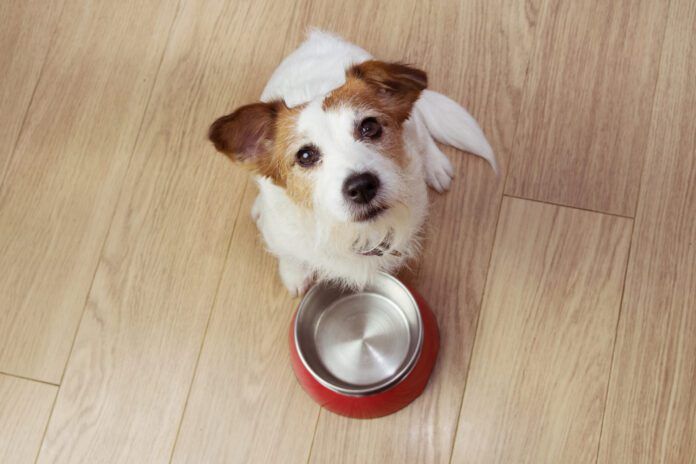The simplest, safest, and best remedy for vomiting is one of the hardest: A fast. (Note: This does not apply if your dog is a puppy or diabetic.) Not feeding your dog when he looks at you with those big, beautiful eyes is hard to resist, but giving your dog’s gastrointestinal tract a rest can be all that is needed.
The total fast time should not exceed 24 hours. After about six hours of fasting, you can start adding water because you don’t want to risk dehydration. Just control his intake a bit. Offer small amounts of fresh water off and on over the day or put ice chips in his bowl instead of water.
Watch to be sure your dog is not getting dehydrated. Check his gums for pinkness and moisture. Also pick up skin near his neck and see if it folds right back down or “tents up.” If he is getting dehydrated, he needs to go to the veterinary clinic for fluids.
You can also offer bouillon to restore some electrolytes. Depending upon your veterinarian’s recommendation for your dog, you may begin feeding small amounts of bland food like chicken and plain white rice at the eight- to 12-hour mark. After 24 hours with no vomit, start back with increased amounts of the chicken and rice and slowly work in his regular diet.
Check the Vomit
It’s important to look carefully at the dog’s vomit before you clean it up (yeah, it’s gross, but you must). Just reaching for a home remedy for vomiting or diarrhea may not be wise in some case. Call your veterinarian, if:
- There is blood – either bright red or a black coffee-grounds type appearance
- You see pieces of a mushroom or any medications (as in your beloved puppy chewed into a medicine bottle)
- The vomiting is accompanied by diarrhea
- The dog may have eaten something he shouldn’t have, like a sock, a rock, or heaven knows anything else he might have found
OTC Vomiting Remedies for Dogs
For most vomiting cases, you usually can try a home remedy for 24 hours or so to combat an upset stomach with nausea and/or vomiting to see if it helps. If you’re concerned about anything, contact your veterinarian immediately. (You can also try the suggestions below for most diarrhea that is not bloody.)
Pepto Bismol (bismuth subsalicylate) can be used with dogs to safely reduce signs of nausea, heartburn, gurgling, uncomfortable stomach, and diarrhea. A generally accepted safe dose of regular-strength Pepto Bismol (or a generic) for dogs is 0.25 to 2 ml per kg of the dog’s body weight (0.1 to 0.9 ml per lb), for a maximum of three to four times a day. Be aware that use of Pepto Bismol may change the color of your dog’s stool to a gray or greenish-black.
Some dogs will drink Pedialyte, but it may not be the best choice. Because of Pedialyte’s high salt content, you should use caution giving Pedialyte to dogs with heart or kidney diseases, as sodium restriction is often part of managing these conditions. In addition, the level of sugar in Pedialyte is not appropriate for dogs.
Can dogs eat ginger? Yes. Just as your mother probably gave you ginger ale to drink when you were battling a stomachache, ginger can help dogs too (but not the soda!). You can make ginger or chamomile tea. Your dog may prefer a touch of honey added to entice him to drink. Do not give him straight ginger root to chew on.






